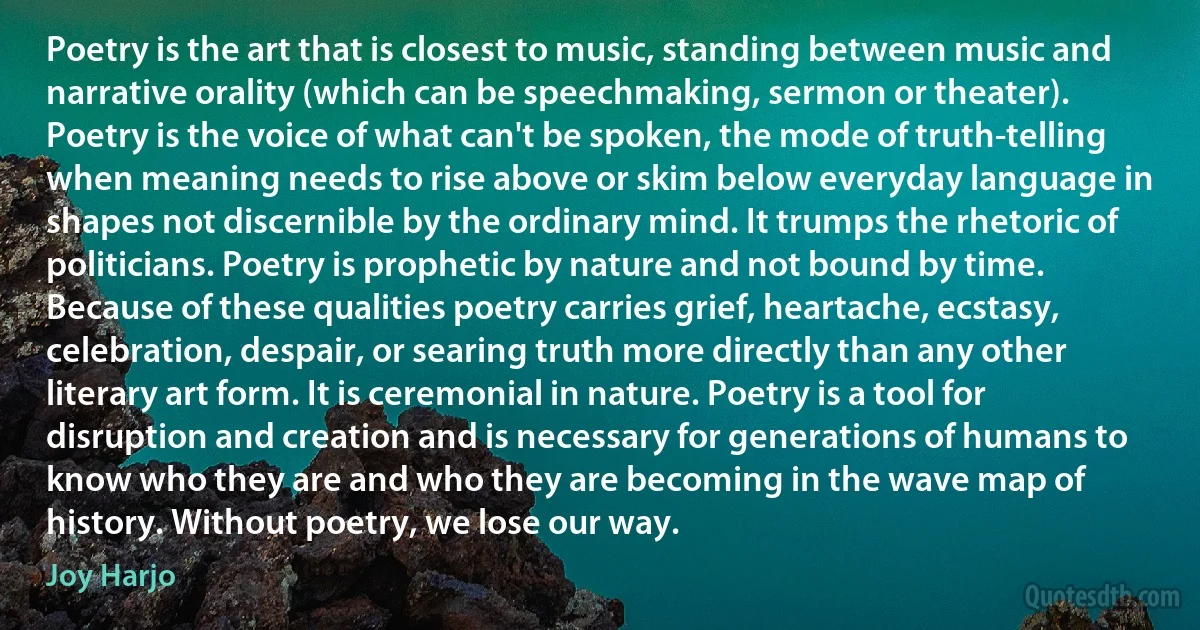
Poetry is the art that is closest to music, standing between music and narrative orality (which can be speechmaking, sermon or theater). Poetry is the voice of what can't be spoken, the mode of truth-telling when meaning needs to rise above or skim below everyday language in shapes not discernible by the ordinary mind. It trumps the rhetoric of politicians. Poetry is prophetic by nature and not bound by time. Because of these qualities poetry carries grief, heartache, ecstasy, celebration, despair, or searing truth more directly than any other literary art form. It is ceremonial in nature. Poetry is a tool for disruption and creation and is necessary for generations of humans to know who they are and who they are becoming in the wave map of history. Without poetry, we lose our way.
Joy HarjoRelated topics
above art becoming bound ceremonial disruption ecstasy form grief history language lose meaning mind music narrative nature necessary needs rhetoric rise searing sermon speak standing time truth voice wayRelated quotes
Why should a poet pray thus? poets scorn
The boundaried love of country, being free
Of winds, and alien lands, and distances,
Vagabonds of the compass, wayfarers,
Pilgrims of thought, the tongues of Pentecost
Their privilege, and in the peddler's pack
The curious treasures of their stock-in-trade,
Bossy and singular, the heritage
Of poetry and science, polished bright,
Thin with the rubbing of too many hands;
Myth, glamour, hazard, fables dim as age,
Faith, doubt, perplexity, grief, hope, despair,
Wings, and great waters, and Promethean fire,
Man's hand to clasp, and Helen's mouth to kiss.
Why then in little meadows hedge about
A poet's pasture? shed a poet's cloak
For fustian? cede a birthright, thus to map
So small a corner of so great a world?

Vita Sackville-West
The other conclusion is that art is the complement of science. Science as I have said is concerned wholly with relations, not with individuals. Art, on the other hand, is not only the disclosure of the individuality of the artist but also a manifestation of individuality as creative of the future, in an unprecedented response to conditions as they were in the past. Some artists in their vision of what might be, but is not, have been conscious rebels. But conscious protest and revolt is not the form which the labor of the artist in creation of the future must necessarily take. Discontent with things as they are is normally the expression of the vision of what may be and is not, art in being the manifestation of individuality is this prophetic vision.

John Dewey
And now when the retorts and beakers with their several necks and tubes and the appurtenances thereof were set in order, and the unhallowed processes of fixation, conjunction, deflagration, putrefaction, and rubefication were nearing maturity, and the baleful star Antares standing by the astrolabe within a little of the meridian signified the instant approach of midnight, the King described on the floor with his conjuring rod three pentacles inclosed within a seven-pointed star, with the signs of Cancer and of Scorpio joined by certain runes. And in the midst of the star he limned the image of a green crab eating of the sun. And turning to the seventy-third page of his great black grammarie the King recited in a mighty voice words of hidden meaning, calling on the name that it is a sin to utter.

Eric Rücker Eddison
After one of those terrible lovers' quarrels that leave one in a state of incomprehensible despair. I came out of the theater, tears streaming, and overheard the petulant voice of a college girl complaining to her boyfriend, "Well I don't see what was so special about that movie." I walked up the street, crying blindly, no longer certain whether my tears were for the tragedy on the screen, the hopelessness I felt for myself, or the alienation I felt from those who could not experience the radiance of Shoeshine. For if people cannot feel Shoeshine, what can they feel?... Later I learned that the man with whom I had quarreled had gone the same night and had also emerged in tears. Yet our tears for each other, and for Shoeshine did not bring us together. Life, as Shoeshine demonstrates, is too complex for facile endings.

Pauline Kael
Leisure lives on affirmation. It [...] includes within itself a celebratory, approving, lingering gaze of the inner eye on the reality of creation.
The highest form of affirmation is the festival; and according to Karl Kerenyi, the historian of religion, to festival belong "peace, intensity of life, and contemplation all at once." The holding of a festival means: an affirmation of the basic meaning of the world, and an agreement with it, and in fact it means to live out and fulfil one's inclusion in the world, in an extraordinary manner, different from the everyday.
The festival is the origin of leisure, its inmost and ever-central source. And this festive character is what makes leisure not only "effortless" but the very opposite of effort or toil.

Josef Pieper
